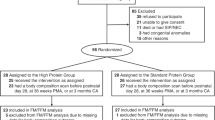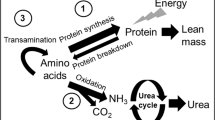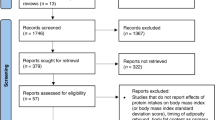Abstract
Objective:
To determine if enteral protein and energy supplementation would significantly improve weight gain as compared with energy supplementation alone in ⩽1250 g infants.
Study Design:
Inclusion criteria were birth weight (BW) ⩽1250 g, postnatal age ⩾14 days, diet of ⩾75% enteral nutrition (fortified human milk or formula) and either failure to regain BW or weight gain<15 g kg−1 per days. Infants were randomized to a multinutrient supplement that provided increased protein and energy (P/E) intake or energy alone (medium chain triglyceride oil, MCT). Growth rates were compared at the end of the 4-week study period.
Result:
Of 30 eligible infants, 23 were enrolled, 12 received MCT (BW=862±252 g, mean±s.d.) and 11 received P/E (BW=879±241 g). Significantly higher protein intake (P/E=3.5±0.3 g kg−1 per day, MCT=3.0±0.5 g kg−1 per day) and better growth (P/E=17.0±2.4 g kg−1 per day, MCT=11.5±4.8 g kg−1 per day) were observed in the P/E group.
Conclusion:
These data are consistent with the importance of providing additional daily protein intake to achieve increased postnatal growth in very low birth weight infants experiencing slow growth.
This is a preview of subscription content, access via your institution
Access options
Subscribe to this journal
Receive 12 print issues and online access
$259.00 per year
only $21.58 per issue
Buy this article
- Purchase on Springer Link
- Instant access to full article PDF
Prices may be subject to local taxes which are calculated during checkout
Similar content being viewed by others
References
Ehrenkranz RA, Younes N, Lemons JA, Fanaroff AA, Donovan EF, Wright LL et al. Longitudinal growth of hospitalized very low birth weight infants. Pediatrics 1999; 104: 280–289.
Embleton NE, Pang N, Cooke RJ . Postnatal malnutrition and growth retardation: an inevitable consequence of current recommendations in preterm infants? Pediatrics 2001; 107: 270–273.
Cooke RJ, Ainsworth SB, Fenton AC . Postnatal growth retardation: a universal problem in preterm infants. Arch Dis Child Fetal Neonatal Ed 2004; 89: F428–F430.
Hack M, Breslau N, Weissman B, Aram D, Klein N, Borawski E . Effect of very low birth weight and subnormal head size on cognitive abilities at school age. N Engl J Med 1991; 325: 231–237.
Peterson J, Taylor HG, Minich N, Klein N, Hack M . Subnormal head circumference in very low birth weight children: neonatal correlates and school-age consequences. Early Hum Dev 2006; 82: 325–334.
Ehrenkranz RA, Dusick AM, Vohr BR, Wright LL, Wrage LA, Poole WK, RA for the National Institutes of Child Health and Human Development Neonatal Research Network. Growth in the neonatal intensive care unit influences neurodevelopmental and growth outcomes of extremely low birth weight infants. Pediatrics 2006; 117: 1253–1261.
Reis BB, Hall RT, Schanler RJ, Berseth CL, Chan G, Ernst JA et al. Enhanced growth of preterm infants fed a new powdered human milk fortifier: a randomized, controlled trial. Pediatrics 2000; 106: 581–588.
Guerrini P . Human milk fortifiers. Acta Paeditr Suppl 1994; 402: 37–39.
Kuschel CA, Harding JE . Carbohydrate supplementation of human milk to promote growth in preterm infants. Cochrane Database Syst Rev 2000; (2): CD000280.
Kuschel CA, Harding JE . Fat supplementation of human milk for promoting growth in preterm infants. Cochrane Database Syst Rev 2000; (2): CD000341.
Kuschel CA, Harding JE . Protein supplementation of human milk for promoting growth in preterm infants. Cochrane Database Syst Rev 2000; (2): CD000433.
Kuschel CA, Harding JE . Multicomponent fortified human milk for promoting growth in preterm infants. Cochrane Database Syst Rev 2000; (2): CD000343, Update in 2004;(1):CD000343.
Hans DM, Pylipow M, Long JD, Thureen PJ, Georgieff MK . Nutritional practices in the neonatal intensive care unit: analysis of a 2006 neonatal nutrition survey. Pediatrics 2009; 123: 51–57.
Kashyap S, Forsyth M, Zucker C, Ramakrishnan R, Dell RB, Heird WC . Effects of varying protein and energy intakes on growth and metabolic response in low birth weight infants. J Pediatr 1986; 108: 955–963.
Kashyap S, Schulze KF, Forsyth M, Zucker C, Dell RB, Ramakrishnan R et al. Growth, nutrient retention, and metabolic response in low birth weight infants fed varying intakes of protein and energy. J Pediatr 1988; 113: 713–721.
Embleton ND, Cooke RJ . Protein requirements in preterm infants: effect of different levels of protein intake on growth and body composition. Pediatr Res 2005; 58: 855–860.
American Academy of Pediatrics Committee on Nutrition. Nutritional needs of the preterm infant. In: Ronald E, Kleinman, MD (ed). Pediatric Nutrition Handbook, 5th edn. American Academy of Pediatrics: Elk Grove Village, IL, 2004, pp 23–54.
Bach AC, Babayan VK . Medium-chain triglycerides: an update. Am J Clin Nutr 1982; 36: 950–962.
Alexander GR, Himes JH, Kaufman RB, Mor J, Kogan M . A United States National Reference for fetal growth. Obstet Gynecol 1996; 87: 163–168.
Walsh MC, Liegman RM . Necrotizing enterocolitis: treatment based on staging criteria. Pediatr Clin North Am 1986; 33: 179–201.
Papile LA, Burstein J, Burstein R, Koffler H . Incidence and evolution of subependymal and intraventricular hemorrhage: a study of infants with birth weights less than 1,500 gm. J Pediatr 1978; 92: 529–534.
Palazzi DL, Klein JO, Baker CJ . Bacterial sepsis and meningitis. In: Remington JS, Klein JO, Wilson CB, Baker CJ (eds). Infectious Diseases of the Fetus and Newborn Infant, 6th edn. WB Saunders: Philadelphia, PA, 2006, pp 248.
Jobe AH, Bancalari E . Bronchopulmonary dysplasia. Am J Respir Care Med 2001; 163: 1723–1729.
Carlson SJ, Zeigler EE . Nutrient intakes and growth of very low birth weight infants. J Perinatol 1998; 18: 252–258.
Olsen IE, Richardson DK, Schmid CH, Ausman LM, Dwyer JT . Intersite differences qin weight growth velocity of extremely premature infants. Pediatrics 2002; 110: 1125–1132.
Schulze KF, Stefanski M, Masterson J, Spinnazola R, Ramakrishnan R, Dell BB et al. Energy expenditure, energy balance, and composition of weight gain in low birth weight infants fed diets of different protein and energy content. J Pediatr 1987; 110: 753–759.
Valentine CJ, Fernandez S, Rogers LK, Gulati P, Hayes J, Lore P et al. Early amino-acid administration improves preterm infant weight. J Perinatol 2009; 29: 428–432.
Radmacher PG, Lewis SL, Adamkin DH . Early amino acids and the metabolic response of ELBW infants (⩽1000 g) in three time periods. J Perinatol 2009; 29: 433–437.
Poindexter BB, Langer JC, Dusick AM, Ehrenkranz RA, for the National Institute of Child Health and Human Development Neonatal Research Network. Early provision of parenteral amino acids in extremely low birth weight infants: relation to growth and neurodevelopmental outcome. J Pediatr 2006; 148: 300–305.
Stephens BE, Walden RV, Gargus RA, Tucker R, McKinley L, Mance M et al. First-week protein and energy intakes are associated with 18-month developmental outcomes in extremely low birth weight infants. Pediatrics 2009; 123 (5): 1337–1343.
Arslanoglu S, Moro GE, Ziegler EE . Preterm infants fed fortified human milk receive less protein than they need. J Perinatol 2009; 29: 489–492.
Acknowledgements
All nutritional supplements were provided by Mead Johnson Nutritionals. This study was supported in part by Yale Children's Clinical Research Center Grant MO1-RR06022. HLB was supported by National Institute of Child Health and Human Development Training Grant T32HD07094 during the performance of this research project. We thank Debra Camputaro, Janet Healey and Joshua C Brumberg for their assistance.
Author information
Authors and Affiliations
Corresponding author
Ethics declarations
Competing interests
The authors declare no conflict of interest.
Rights and permissions
About this article
Cite this article
Brumberg, H., Kowalski, L., Troxell-Dorgan, A. et al. Randomized trial of enteral protein and energy supplementation in infants less than or equal to 1250 g at birth. J Perinatol 30, 517–521 (2010). https://doi.org/10.1038/jp.2010.10
Received:
Revised:
Accepted:
Published:
Issue Date:
DOI: https://doi.org/10.1038/jp.2010.10
Keywords
This article is cited by
-
Aggressive Nutrition of the Preterm Infant
Current Pediatrics Reports (2013)
-
Neurocritical Care for Neonates
Current Treatment Options in Neurology (2011)



